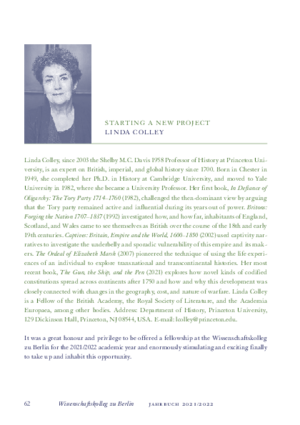
Dame Linda Colley, Ph.D.
Shelby M.C. Davis 1958 Professor of History
Princeton University
Born in 1949 in Chester, United Kingdom
Studied History at Bristol University and at Cambridge University
Arbeitsvorhaben
"Becoming Global: Britain 1688-1815" and a Theoretical Article Taking Off from My Book "The Gun, the Ship, and the Pen" (2021)
I anticipate working on two main projects. The first is to write the eighteenth-century volume of the Penguin New History of Britain, which I have provisionally entitled "Becoming Global: Britain 1688-1815."Part of the original stimulus for this came from reading Sebastian Conrad's "Globalisation and the Nation in Imperial Germany" (2010), especially its concluding remark (p. 402): "What has still to be undertaken is an analysis of national history in a global context, in which the nation is not the starting-point of the investigation but rather the object to be explained within a global context". There are obvious ways in which such an approach fits very snugly and usefully with varieties of British experience in the 1688-1815 period. It was in this era that what became the United Kingdom also evolved into the prime world power and most dominant maritime empire. As a result, this polity was especially and progressively exposed at this time to developments, commodities, commerce, knowledge, and contacts across all continents and all oceans.
During the past two decades or so, vast amounts of new writings and research have been devoted to these themes. However, while this scholarly extroversion is welcome, an enhanced focus on varieties of the global and the imperial in the British past in this era has sometimes had the effect of pushing aside the mixed and essential European dimensions of this same society. It has also obscured the important degree to which all of these things - the global, the imperial, and the European - were interconnected.
One of the things I hope to develop from extended time in Berlin is an enhanced appreciation of Continental European histories to combine with my recent deep exploration of global history so as to complete a renovated, balanced, multilateral, and enquiring eighteenth-century British history. My second project will be to develop out of my new book "The Gun, the Ship, and the Pen: Warfare, Constitutions and the Making of the Modern World" a more abstract and theoretical long article, possibly for publication in the American History Review.
Recommended Reading
Colley, Linda. Britons: Forging the Nation 1707-1837. New Haven, CT: Yale University Press, 1992.
-. The Ordeal of Elizabeth Marsh: A Woman in World History. London: HarperCollins, 2007.
-. The Gun, The Ship, and the Pen: Warfare, Constitutions, and the Making of the Modern World. New York: Liveright, 2021.
Kolloquium, 31.05.2022
Verfall und Untergang und Aufstieg: Edward Gibbon in der Welt
Zwischen 1776 und 1788 veröffentlichte Edward Gibbon sein mehrbändiges Meisterwerk "Decline and Fall of the Roman Empire" (dt. "Verfall und Untergang des römischen Imperiums"). Im Unterschied zu früheren Untersuchungen über das antike Rom und den Untergang von Imperien hatte dieses Werk sofort internationalen Erfolg und wurde viel diskutiert. Es wird immer noch gedruckt und gehört zu den meistübersetzten Geschichtswerken der Welt. Ein Grund für seine weitreichende und anhaltende Wirkung liegt darin, dass "Decline and Fall" im Laufe der Zeit und auf allen Kontinenten als Kommentar zu und Kritik an Machtstrukturen, Herrschaft und Korruption genutzt wurde. Für gewöhnlich wird Gibbon nur mit Blick auf die Antike und das Mittelalter und seinen eigenen intellektuellen Kontext untersucht. Dagegen möchte ich in diesem Kolloquium einige Gründe für die ungewöhnliche Wirkung und das lange und wechselvolle Nachleben seines berühmtesten Buches herausarbeiten und analysieren.


